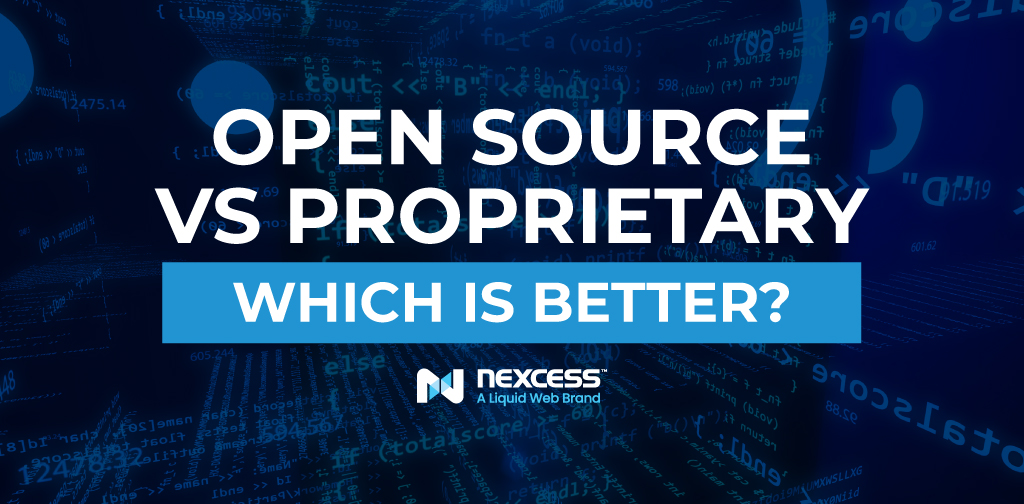How do you decide between open source vs. proprietary technology?
From ecommerce to content management, the open source vs. proprietary debate arises frequently when evaluating web technologies.
In this post, we’ll cover the differences and benefits of using open source or proprietary technology and highlight a shortcut to quickly and easily build ecommerce websites on an open source platform.
Open Source vs. Proprietary: Differences
Open source refers to technology and software that is available for anyone to use or edit. Proprietary is copyrighted technology that must be used with a license.
What is the Difference Between Open Source and Proprietary Software?
Open source software is publicly available without a licensing fee or restrictions on use or modification. The companies that own and publish proprietary software charge licensing fees and restrict the use and modification of their technology.
Differences Between Open Source vs. Proprietary
| Open Source vs. Proprietary | Open Source | Proprietary |
| Open Source vs. Proprietary Cost | Open source software is free to use and modify. For web technologies, you still need to pay for web hosting or set up your own server. | Proprietary software requires companies to purchase a license. While companies sell some proprietary software as a one-time purchase, most businesses use a subscription model known as Software as a Service (SaaS). |
| Open Source vs. Proprietary Updates and Maintenance | Companies can publish open source software, but open source is often community-maintained. Either way, you can expect periodic updates and patches. | Proprietary software companies release regular updates with new features and bug fixes. |
| Open Source vs. Proprietary Flexibility | With open source software, you’re free to use or modify the code as needed. | Proprietary software comes with restrictions. You most likely won’t have access to modify the code. Companies also place limits on the software, such as the number of users or transactions. |
| Open Source vs. Proprietary Support | When you run into issues with an open source system, you’re stuck searching community forums and documentation for answers. You also can hire a developer with experience with the platform. | Proprietary software companies normally have support teams to help customers troubleshoot issues. |
Open Source vs. Proprietary Examples
You can find open source software in various categories. Below are some of the most common open source and proprietary software examples in the web and mobile development space.
| Types of Open Source vs. Proprietary Examples | Open Source | Proprietary |
| Content Management System or Website Builder | WordPress, ExpressionEngine, Drupal | Wix, Squarespace, Weebly |
| Ecommerce Platform | WooCommerce, Magento Open Source | BigCommerce, Shopify, Magento Commerce |
| Mobile Operating System | Android | iOS |
Open Source vs. Proprietary: Which Should You Choose?
Proprietary and open source technologies both have advantages. Deciding between the two often comes down to your level of technical expertise and need for customization.
Benefits of open source technologies include:
- Control. With an open source system, you have total control. You can change the code if needed. You also own the system and can control who has access to it and any data it includes.
- Flexibility. There are no limits on open source software. You can customize it to your heart’s content. Also, you won’t be bound by licensing or usage limits. For example, BigCommerce places annual sales limits on its plans. If you exceed a certain threshold in annual sales, you have to upgrade to the next plan level.
- Costs. Open source software is free. You’re only paying for any technical infrastructure like hosting and the staff or contractor resources needed to build out the system.
Benefits of proprietary technology include:
- Ease of Use. Proprietary systems tend to be more turnkey. If you want to open an online store, many people find it’s easier than building a WooCommerce store from scratch.
- Dedicated Support. Proprietary software offers dedicated support for customers, so you aren’t at the mercy of community discussion boards and YouTube videos.
- All-in-One Subscription. Many SaaS platforms include hosting. You might have to purchase your domain registration, but everything else is included.
Get the Benefits of Both Open Source and Proprietary
If you want to build an ecommerce site and enjoy the benefits of open source software, consider using WooCommerce — it's the most popular open source ecommerce platform for a reason.
Unlike systems like Shopify or BigCommerce, the site you build with WooCommerce is 100% portable — you can take it with you if you choose to change platforms. You own your store and your data on these open source platforms, unlike most proprietary solutions.
Plus, there are no transaction fees to worry about. Since it's based on WordPress, WooCommerce is quick and easy to get set up.
And managed WooCommerce hosting from Nexcess takes care of your website so you can focus on your business.
Managed WooCommerce hosting is specially optimized for online stores — so your site will always be fast and secure. Plus at Nexcess, you’ll have access to our team of WordPress and WooCommerce experts.
Nexcess Stands By the Open Source Community
At Nexcess, we believe in the power of open source technology and support the businesses and developers utilizing platforms like WordPress and WooCommerce.
Whether you’re a freelancer, agency, or business owner, Nexcess offers the best hosting for any open source solution.
Check out our plans to get started today.

